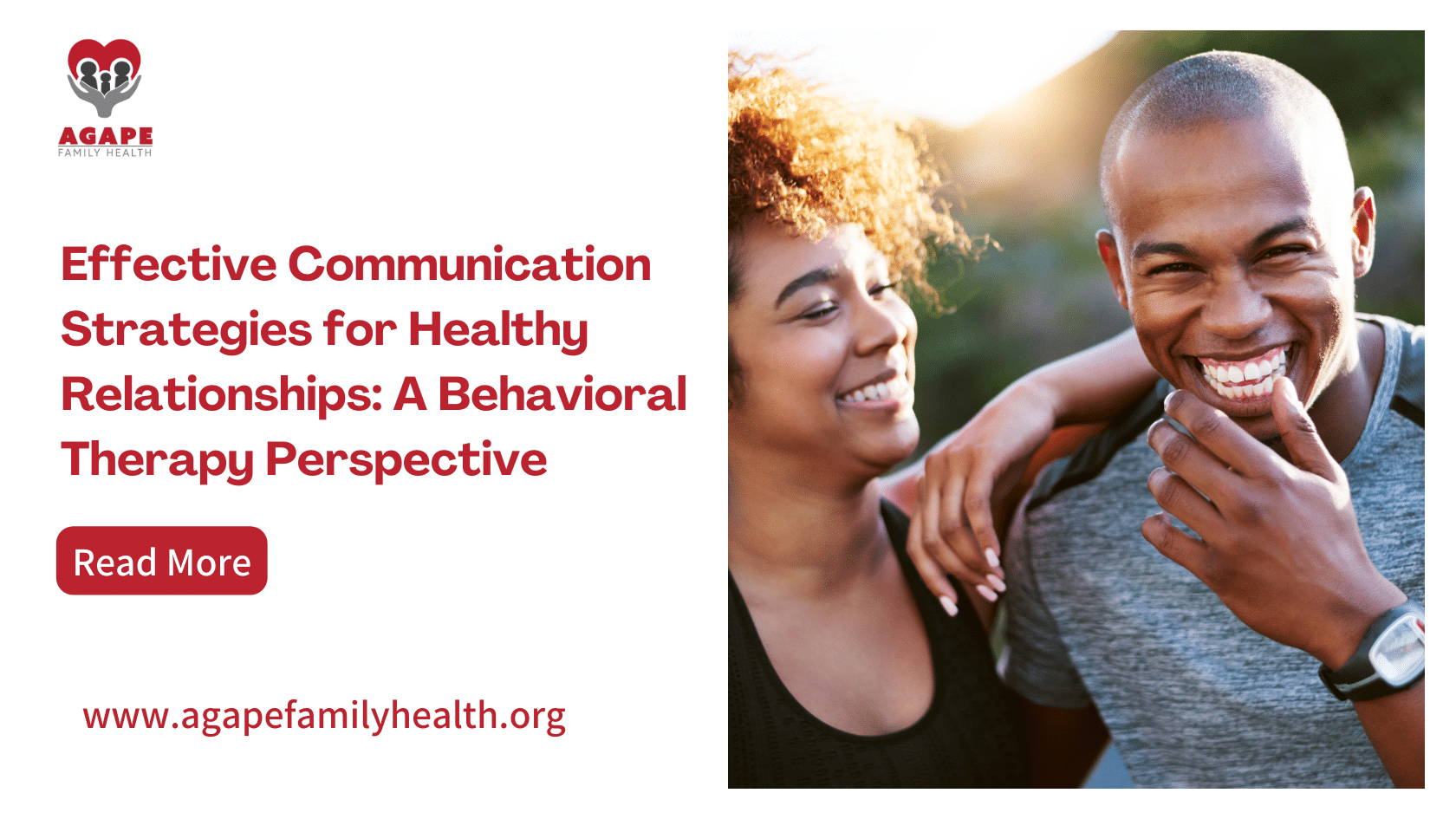Communication is the foundation of any successful relationship, be it romantic, familial, or professional. Effective communication strategies for healthy relationships are essential for fostering understanding, trust, and intimacy in relationships. From a behavioral therapy perspective, communication plays a vital role in shaping how individuals interact and respond to each other. In this blog, we will explore the key elements of effective communication and how behavioral therapy principles can help enhance communication skills for building and maintaining healthy relationships.
Active Listening
Active listening is more than just hearing what the other person is saying; it involves being fully present and engaged in the conversation. In behavioral therapy, active listening is viewed as an essential skill for building rapport and trust between individuals. When we actively listen, we show empathy and understanding towards the speaker, which helps them feel valued and respected.
Nonverbal Cues
Maintaining eye contact and using appropriate nonverbal cues, such as nodding or smiling, demonstrates that you are actively engaged in the conversation. It conveys interest and encourages the speaker to continue sharing their thoughts and feelings.
Paraphrasing and Clarifying
Active listening includes paraphrasing or restating what the speaker said in your own words. This practice helps ensure that you understand the message accurately and gives the speaker an opportunity to clarify any misconceptions.
Avoiding Distractions
In today’s digital age, distractions are abundant, with smartphones and other devices constantly vying for our attention. When practicing active listening, it is essential to put away distractions and give the speaker your undivided attention. This shows that you value the conversation and the person speaking.
Assertive Communication

Assertive communication is a healthy and balanced way of expressing oneself while respecting the rights and opinions of others. In behavioral therapy, assertiveness is considered an alternative to aggressive or passive communication styles, as it allows individuals to advocate for their needs and preferences without disregarding those of others.
Using “I” Statements
“I” statements focus on expressing your feelings and thoughts without placing blame on the other person. For example, instead of saying, “You never listen to me,” an assertive approach would be, “I feel unheard when I don’t get a chance to share my thoughts.“
Being Specific
Clearly articulating your needs and expectations leaves little room for misunderstanding. Vague communication can lead to frustration and resentment, so being specific helps both parties know what is expected of them.
Remaining Calm
Challenging situations can trigger emotional responses, making it difficult to communicate effectively. Behavioral therapy encourages individuals to practice emotional regulation, remaining calm and composed during difficult conversations.
Avoiding Communication Pitfalls

Recognizing and addressing common communication pitfalls is crucial for maintaining healthy relationships. Behavioral therapy aims to help individuals become aware of these patterns and replace them with more constructive approaches.
Defensiveness
When feeling attacked or criticized, it is common to become defensive. However, defensiveness can escalate conflicts and hinder effective communication. Instead, behavioral therapy encourages individuals to practice self-awareness and respond with openness and receptivity.
Blame-Shifting
Blaming others without taking responsibility for one’s actions leads to a lack of accountability in the relationship. Behavioral therapy promotes self-reflection and the acknowledgment of one’s role in a situation.
Mind-Reading
Assuming what the other person is thinking without seeking clarification can lead to misunderstandings and misinterpretations. Behavioral therapy emphasizes the importance of asking questions and seeking understanding rather than making assumptions.
Silent Treatment
Using silence as a means of control or manipulation can be highly damaging to a relationship. In behavioral therapy, individuals learn to communicate their feelings and needs rather than resorting to passive-aggressive behaviors.
Positive Reinforcement and Validation
Positive reinforcement and validation are powerful tools in fostering a supportive and loving atmosphere in relationships. Behavioral therapy encourages the use of positive language and gestures to strengthen the emotional connection between partners.
Compliments and Gratitude
Compliments and expressions of gratitude are powerful tools that reinforce positive behavior and create a nurturing environment in a relationship. By acknowledging your partner’s efforts and contributions, you show them that their actions are valued and appreciated. This fosters a sense of validation and emotional connection, as the recipient feels seen and recognized for their role in the relationship. Regularly offering compliments and expressing gratitude can strengthen the bond between partners and contribute to a more positive and fulfilling dynamic.
Validating Feelings
Emotional validation plays a crucial role in building trust and intimacy in a relationship. When you validate your partner’s feelings, you are showing them that their emotions are legitimate and understandable, even if you may not share the same perspective. This validation creates a safe space for open and honest communication, as the person feels accepted and supported, which can lead to deeper emotional connections. By validating feelings, you convey empathy and demonstrate that you are willing to listen and understand, even when disagreements arise.
Celebrating Achievements
Celebrating each other’s achievements and milestones is an essential aspect of maintaining a supportive and encouraging relationship. When you celebrate your partner’s successes, big or small, you contribute to their sense of self-worth and confidence. This celebration communicates that you are genuinely happy for their accomplishments and that you are a source of encouragement and motivation in their life. By sharing in each other’s achievements, partners strengthen their bond and create a positive atmosphere of mutual support and growth. Celebrating together reinforces the idea that you are a team, working towards shared goals and aspirations.
Conflict Resolution

Conflict is a natural part of any relationship, but how it is managed can make all the difference. Behavioral therapy equips individuals with effective conflict resolution skills to navigate disagreements in a constructive manner.
Taking a Time-Out
Taking a time-out is a crucial conflict resolution strategy when emotions are running high. By temporarily disengaging from the heated situation, individuals can gain emotional distance and perspective, preventing impulsive and hurtful reactions. This break allows time for emotions to subside and for individuals to regain control over their thoughts and feelings. As a result, when both parties reconvene, they can approach the conflict with a more rational and composed mindset, increasing the chances of finding a constructive resolution that respects each other’s perspectives.
Using “I” Statements
As mentioned above, using “I” statements is a powerful communication technique that promotes openness and reduces defensiveness during conflicts. By framing expressions of feelings and needs with “I” statements, individuals take ownership of their emotions without assigning blame to the other person, fostering a more empathetic and understanding atmosphere for both parties. This approach encourages active listening and mutual respect, facilitating more productive discussions and problem-solving.
Finding Compromises
Behavioral therapy emphasizes the value of finding solutions that consider both partners’ perspectives and values. Finding compromises is a key aspect of effective conflict resolution, as it encourages a collaborative approach to problem-solving in relationships. By taking into account both partners’ perspectives and values, compromises create a sense of fairness and mutual respect. This willingness to find common ground fosters a harmonious and balanced relationship dynamic, where both individuals feel heard and their needs are acknowledged.
Conclusion
Effective communication strategies are the backbone of healthy relationships. From active listening and assertive communication to avoiding communication pitfalls, practicing positive reinforcement, and mastering conflict resolution, behavioral therapy provides invaluable insights and techniques for nurturing strong and harmonious connections with others. By incorporating these principles into our interactions, we can cultivate more fulfilling and satisfying relationships with our partners, family members, and friends.



